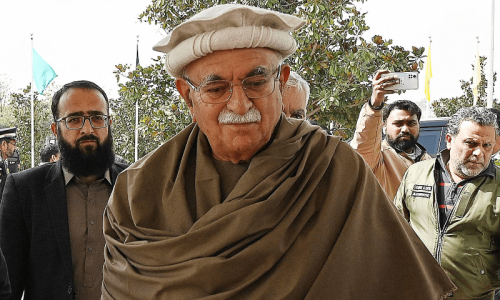IN two recent back-to-back attacks in the southern district of Tank and neighbouring South Waziristan tribal district, eight security personnel were martyred while several others were wounded. Both attacks were claimed by the outlawed Tehreek-i-Taliban Pakistan. Significantly, it was after a long time that the TTP, which had largely restricted its operations to guerilla-like hit-and-run tactics, sniping and roadside bombings, deployed multiple suicide bombers to attack the fort used by the paramilitary FC. These attacks show that the capacity of the Afghanistan-based terror outfit is far from diminished and that it can launch attacks whenever it pleases. This should be a cause of deep concern to the political and military authorities. Pakistan’s security forces have done well to go after the sleeper cells, capturing and killing many militants in intelligence-based operations, but the TTP’s presence in Afghanistan presents a huge challenge that will continue to test the resolve and capabilities of the security apparatus. It is evident that the overtures on the part of the state to negotiate with the militant network through the Afghan Taliban have not yielded the desired results. The authorities here made several attempts through tribal notables, and in some cases, even sent close family members to persuade militant leaders to return to give up their arms and return to a life of normality. While, reportedly, some leaders of the umbrella organisation had showed an interest in laying down their weapons and returning to Pakistan, others simply refused to listen — among them the TTP chief Mufti Noor Wali. He is the leader of the terrorist organisation’s largest Mehsud group which has been behind the attacks in the Mehsud hinterland as well as in the adjoining areas. There is little doubt that both these attacks were carried out by his group — and more can be expected.
For now, Pakistan appears to have few choices, especially given its relations with the hard-line regime in Kabul; a tactical operation to take out the TTP leadership in Afghanistan seems out of the question. Engaging with the militants is not an option either at this stage. The state’s own history of negotiating with militants has been defined by failures and broken pledges, as terrorist groups have invariably returned to violence after striking a ‘deal’ with the authorities. It took large-scale military operations to clear the affected areas, but the militants are once more posing a threat. The TTP presented several demands — some of which were met, such as the release of some of its foot soldiers. But there are other demands that impinge upon democratic freedoms, which cannot be accepted by the state. It seems that for now, the best course of action is keep up the pressure on the Afghan Taliban to not allow their country to be used as a launching pad for terrorists who are targeting this country, and for political and military authorities to arrive at a long-term plan to end militancy.
Published in Dawn, April 4th, 2022













































